- Joined
- Oct 30, 2021
- Messages
- 34,296
- Reaction score
- 36,215
- Gender
- Undisclosed
- Political Leaning
- Undisclosed
I wasn't sure where to put this, but the issue of real estate investors is becoming hugely problematic and only seems more likely to worsen in the years ahead.

 www.yahoo.com
www.yahoo.com
Nobody should be allowed to own 80,000 ****ing homes. Nobody. Call it socialism or whatever - fine. That's 80,000 families that could live in a home that's more affordable, owned by one corporation. They're not the only corporation that does this either.

Lawmakers say mega-landlords are snatching up the American dream — leaving renters struggling to get ahead
Many Americans may be stuck in "the rental trap" since corporations bulk-bought homes during the 2008 financial crisis.
Jove rents from Invitation Homes, one of the country’s biggest players in the single-family rental market. The real estate giant owns over 80,000 properties nationwide, hundreds in Northeast Florida alone, and is now at the center of an inquiry led by Georgia Senator Jon Ossoff.
Launched in May, Ossoff’s investigation also includes other corporate landlords – Main Street Renewal, Tricon Residential, and Progress Residential – that he says are inflating rental markets, outbidding families, and locking out would-be homeowners in Georgia.
Nobody should be allowed to own 80,000 ****ing homes. Nobody. Call it socialism or whatever - fine. That's 80,000 families that could live in a home that's more affordable, owned by one corporation. They're not the only corporation that does this either.

